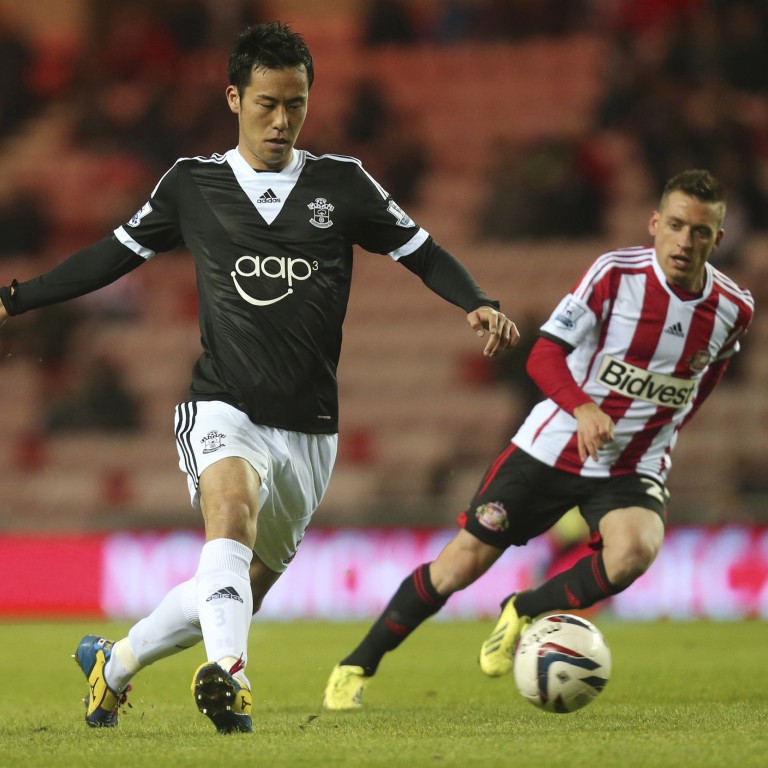
Soccer diplomacy is a win-win for EPL and China
Premier League is a prized asset worth millions and helps maintain Britain's standing in Asia - and the world
When the state-run said in its scathing op-ed this week that Britain was just a small, inconsequential and old European nation fit only for overseas study, tourism and with a few good football teams, it was bang on the money.
Chinese football fans Jane (her preferred Anglophonic name) and Meimei personified the GT's claim, made during Prime Minister David Cameron's trade mission to the mainland, a trip allowed only after the British leader promised to never again meet with an unmentionable exiled monk.
Jane and Meimei are students, along with hundreds of their compatriots, studying at Southampton University, and all are among the tens of thousands of bright young things relying heavily on a British education to get them ahead in the world.
English football has wooed millions of mainland fans over the past two decades and there is clearly plenty more to be won over
They were mingling around the busy concourse at half-time during the midweek clash between the Saints and Aston Villa. Every home match has sizeable contingents of Chinese, Koreans, Taiwanese, Hongkongers and Japanese, a cultural mix witnessed at most EPL clubs week in, week out.
"We love football," the pair gushed as they watched the English queue and shuffle in an orderly fashion towards the food and beverage counters, and of course the toilets.
They said they liked watching the Saints, especially Japanese defender Maya Yoshida, who was in the starting line-up, proof perhaps that recent geopolitical tensions back home have not dampened the spirit of camaraderie among the East Asian diaspora.
No, they said, they had not read or heard about the belittling of their hosts. Jane, who is studying for a business degree, was unaware the rambunctious organ even existed.
But yes, they say, Britain is a great place to visit, to study in and watch great football. Attempts to engage them in wider discussion about the mechanics of realpolitik and how nations sell out their ethical positions to boost their mutual economies, were thankfully (for them at least) thwarted by the teams returning to the pitch for the second half.
"We love your country," giggled Meimei, but not Villa, who cruelly robbed the Saints of three points.
In the eyes of many indigenous fans on the terraces - traditionally a political bunch - Cameron's trade mission is being viewed as something of a fire sale of everything Britain holds dear, from human rights to security in our energy, telecommunications and transport networks.
Among Cameron's 150-strong delegation of business leaders was EPL chief executive Richard Scudamore.
Are we to see the sale of the EPL to China, some wag joked, though there is genuine concern that in these uncertain times anything is possible and everything is up for grabs.
Thankfully, such a sell-off looks unlikely. Scudamore, with the support of former England international Graeme le Saux, was actually selling more of the "quintessentially English" stuff to the Chinese. English football has wooed millions of mainland fans over the past two decades and there is clearly plenty more to be won over.
Scudamore signed an agreement in Beijing with the Chinese Super League (CSL) and Chinese Football Association (CFA) to operate programmes to promote the development of the game in China, including Beijing Guoan and Shanghai Shenhua.
In return, the CSL will provide support and advice in the promotion and marketing of the EPL, one of those "win-win" thingamajigs.
And both leagues will work together on regular exchanges and training programmes for coaches and other staff, including "delegations from both leagues attending match days in the other's country".
All very cosy and there was not a whisper about recent match-fixing allegations. Crucially, the deal underscores the immense value and importance placed on the EPL by the establishment to export British values and brands. It is a prized asset worth millions and helps maintain Britain's standing in the world, whatever China's whimsical state-media may think.
Coincidentally, days before jetting off to China, Scudamore appeared before a House of Lord's committee looking into "soft power" and Britain's diplomatic influence abroad.
A panel of politicians quizzed him about the proportion of home-grown players in the EPL, which has dropped to around a third, while 11 out of 20 clubs now have foreign owners.
Scudamore insisted the EPL remains English through and through despite the foreign influx. "We have a pretty sophisticated marketing machine at the Premier League [its official domestic title] … But anywhere outside this country it is known as the English Premier League," he said.
"There is a huge association with it being quintessentially English. The overseas owners and players buy into that. They are buying something very authentic that has been there since 1888."
Scudamore understands realpolitik, based on raw power rather than lofty ideals.
"You can't have it all ways. David Cameron talks about Britain being open for business. If this country does business overseas, these people have to be able to do business here," he said.
Scudamore said there was no distinction between an English owner and a foreign owner, and whether they are good or bad.
"The only thing that matters to us is whether they are a decent owner," he said.
Of course, not all of them are. But the majority of indigenous fans would agree that English football has benefited from the involvement of foreigners and their money.

